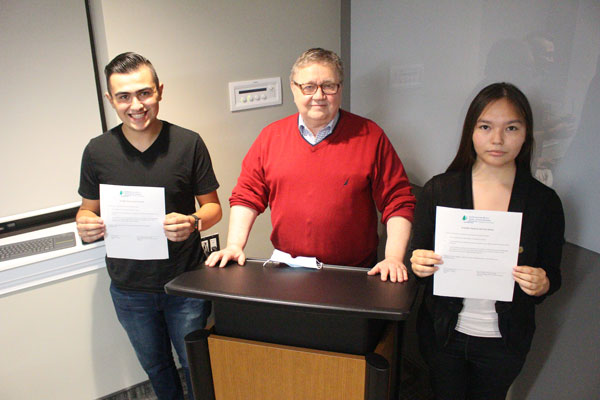
The Saskatchewan Rivers Students for Change (SRSC) trustees have the floor for a time at each meeting of the Saskatchewan Rivers School Division board.
New trustees Tia-Lee McCallum and Daniel Vidal have used this platform to provide more on the ground reports from the high schools in the division.
At the board’s meeting on Monday urban trustee McCallum gave the presentation in person as rural trustee Vidal was attending virtually. She shared an extensive list of activities and events that have been planned by students for students in various schools.
“It is great for the board to know all of these kinds of things that are planned by students, for students in the schools and this time of year it is great for lots of those spirit activities and those social and fun morale boosting activities,” director of education Robert Bratvold said.
Bratvold explained that the presentations by the SRSC each meeting give a better idea of what is happening at the school level. McCallum has also created a living document that is emailed to each trustee following the meeting.
“The verbal report can be sort of dense or hard to process all of the information so it’s great to have that document that she shares as well,” Bratvold said.
McCallum spoke about a variety of activities that included a mix of student events. She also drew attention to areas that can provide deeper support for student well-being.
“There is an inkling in there of the things that recognizes that students need support in different ways,” Bratvold said. “It is great for the board to hear that and hear it directly from students who are connected with other students at high schools across the division.”
Vice Chair Darlene Rowden also presented the Board’s 2021-2022 Advocacy Plan which was finalized at the meeting. It also has a focus on advocacy targets similar to that aspect of the SRSC presentation, with learning and innovation and mental health and well-being as aims.
The long-term goal areas in the report include the above along with inclusion and cultural responsiveness, citizenship and relationships and governance and leadership.
Among the learning and innovation targets are plans to ensure the elimination of provincial examinations or departmental exams for Grade 12 students.
Bratvold explained that the board has had discussions about a perceived inequity in the departmental exams. He added that less than 20 per cent of students in Saskatchewan take those exams.
“The board itself has had some conversations around that as well about the inequity they perceive in departmental exams,” Bratvold said.
“That has been on the board’s agenda for a while. They just wanted to strategize that as an opportunity,” he added.
Because of the COVID-19 pandemic the Ministry of Education made departmental exams optional.
“In March 2020 everybody went home so provincial exams just didn’t happen in June and then in June 2021 they suspended or they said that departmental are optional and it’s the same thing for June 2022,” he said.
The actions include acquiring data that supports the goal of elimination including fiscal and academic and developing support for the goal from other trustees and boards of education. They will also try to find support from School Community Councils (SCCs) by providing data and rationale that supports the notion and ensure that parents have their questions answered. They will also consider discussions and communications at the provincial and local level with the Saskatchewan Teachers Federation (STF).
Another aspect was meeting with MLAs and the Minister of Education to provide rationale behind the concept. They will also write to the Minister of Education and others in support of this concept.
“It is an opportunity to say, ‘hey we have done this, kids still learn, kids still succeed, get their credits and graduate, so do we have to continue this program? Does it still have benefit for the regular operations?’” Bratvold explained.
michael.oleskyn@paherald.sk.ca

